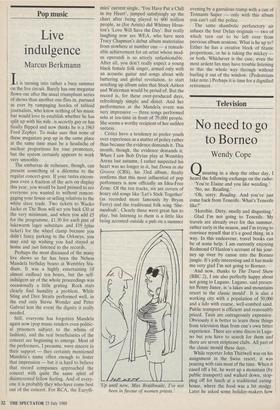Pop music
Live indulgence
Marcus Berkmann
It is turning into rather a busy summer on the five circuit. Barely has one megastar flown out after the usual triumphant series of shows than another one flies in, pursued as ever by rampaging hordes of tabloid journalists, who know nothing of his music but would love to establish whether he has split up with his wife, is secretly gay or has finally flipped and now thinks he is a 1963 Ford Zephyr. To make sure that none of these megastars pop up in the same place at the same time must be a headache of nuclear proportions for tour promoters, but the system certainly appears to work very smoothly.
The embarras de richesses, though, can present something of a dilemma to the regular concert-goer. If your tastes encom- pass even a fraction of the acts on display this year, you would be hard pressed to see everyone you wanted to without remort- gaging your house or selling relatives to the white slave trade. Two tickets to Wacko Jacko or The Boss will set you back £30 at the very minimum, and when you add £5 for the programme, £1.30 for each pint of lukewarm lager substitute and £19 (plus ticket) for the wheel clamp because you didn't fancy parking in the Orkneys, you may end up wishing you had stayed at home and just listened to the records.
Perhaps the most discussed of the many live shows so far has been the Nelson Mandela birthday beano at Wembley Sta- dium. It was a highly entertaining (if almost endless) ten hours, but the self- indulgent air of the whole proceedings was occasionally a little grating. Rock stars clearly find humility a problem. While Sting and Dire Straits performed well, in the end only Stevie Wonder and Peter Gabriel lent the event the dignity it really needed.
Still, everyone has forgotten Mandela again now (pop music renders even politic- al prisoners subject to the whims of fashion), and the real beneficiaries of the concert are beginning to emerge. Most of the performers, I presume, were sincere in their support — they certainly mentioned Mandela's name often enough to foster that impression — but it is hard to believe that record companies approached the concert with quite the same spirit of disinterested fellow feeling. And of every- one it is probably they who have come best out of the concert. For RCA, the Euryth- mics' current single, 'You Have Put a Chill in my Heart', jumped satisfyingly up the chart after being played to 600 million people, as (for Arista) did Whitney Hous- ton's 'Love Will Save the Day'. But really laughing now are WEA, who have seen Tracy Chapman's debut album materialise from nowhere at number one — a remark- able achievement for an artist whose mod- us operandi is so utterly unfashionable. After all, you don't really expect a young black female folk singer, armed only with an acoustic guitar and songs about wife battering and global revolution, to start notching up album sales that Stock Aitken and Waterman would be proud of. But the record is, for these over-produced days, refreshingly simple and direct. And her performance at the Mandela event was very impressive — three songs performed solo at tea-time in front of 70,000 people. She seems a worthy recipient of her sudden success.
Critics have a tendency to prefer youth over experience as a matter of policy rather than because the evidence demands it. This month, though, the evidence demands it. When I saw Bob Dylan play at Wembley Arena last autumn, I rather suspected his heart was no longer in it, but Down in the Groove (CBS), his 33rd album, finally confirms that this most influential of pop performers is now officially an Idea-Free Zone. Of the ten tracks, six are covers of hoary old songs like 'Let's Stick Together' (as recorded more famously by Bryan Ferry) and the traditional folk song 'She- nandoah'. Clearly these were great fun to play, but listening to them is a little like being accosted outside a pub on a summer 'Up until now, Miss Braithwaite, I've not been in favour of women priests.' evening by a garrulous tramp with a can of Tennants Super — only with this album you can't call the police.
The same shambolic perfunctory air infuses the four Dylan originals — two of which turn out to be left over from previous album sessions. What is he up to? Either he has a creative block of titanic proportions, or he is taking the mickey or both. Whichever is the case, even the most ardent fan may have trouble listening to this the whole way through without hurling it out of the window. (Pedestrians take note.) Perhaps it is time for a dignified retirement.














































 Previous page
Previous page